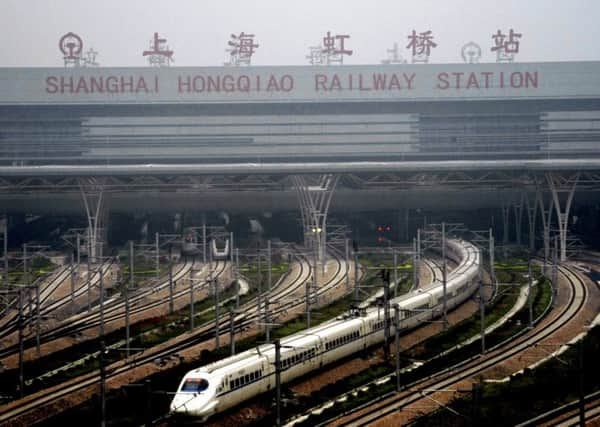A vision of the future that could leave us far behind


Standing in a queue of around 400 just 25 minutes ago, I didn’t expect to be zooming out of Hongqiao with the soaring heights of the new Shanghai Tower and iconic Pearl Tower disappearing in the distant haze out my window.
China is an amazing, sometimes frustrating, mix of hi-tech and unending bureaucracy. At the same time the internal infrastructure in China’s main cities is impressive.
Advertisement
Hide AdAdvertisement
Hide AdNew metro lines are being built everywhere. Whole lines that didn’t exist when I was last in Beijing three years ago are used daily by hundreds of thousands of travellers.
In Xian they were building a new line next to their famous city walls.
In Shanghai, we used the MagLev (short for magnetic levitation) train to get from Pudong airport into Pudong before a quick and easy transfer to the metro and to a stop five minutes from our hotel.
The MagLev reaches speeds of 430km an hour. An eight-minute, 30km trip.
And the cost? The metro/subways are cheap. The normal trip across a myriad of lines is around 3RMB or 30p.
It’s in areas like this that I, living just outside of Inverness, am most impressed.
Our transport infrastructure is poor, and damaging to our economy. Getting down to meetings in Edinburgh and Glasgow on public transport for 9am is impossible. The train is no faster nowadays than if you’d taken it 100 years ago.
Frequently the facilities, temperature and reliability of the services leaves much to be desired: no trolley service; air conditioning blasting in the middle of winter; missed connections due to what often seem like random stops in the middle of moors; few direct trains to Glasgow; the Edinburgh train goes around Fife first. I’m not even going to mention the cost.
Advertisement
Hide AdAdvertisement
Hide AdAs for our road system in the Highlands, between the A9, A96 and A82 we have some of the most dangerous and unfit for purpose roads in the country. I am sure there are many who will feel the same about their local road network.
Some work is being done to improve matters but everything takes a long time, from the initial decision-making processes to construction. It’s obviously possible to do things more quickly – such as in Beijing – but this does not seem to be the case in Britain.
And as we arrive at Dingyuan an hour and 45 mins and 400km after we left Shanghai, my fear is that unless we in the UK radically overhaul our infrastructure planning, we could easily be left behind, unable to compete in the global market that we are re-entering as a single and smaller entity.
Visiting China, and particularly, Shanghai, feels like visiting the future. And we are nowhere near.
l Jennifer MacKenzie is MD of TEFL Org UK, Inverness. TEFL Org UK provides training in teaching English as a foreign language .